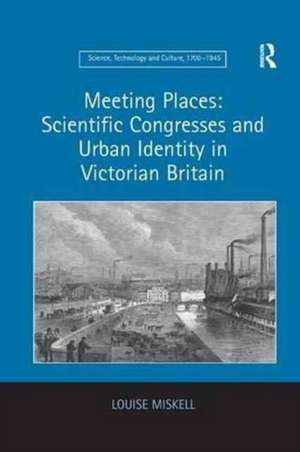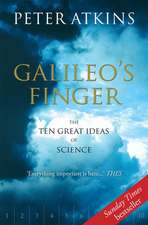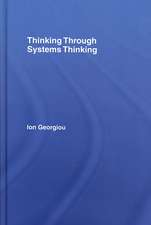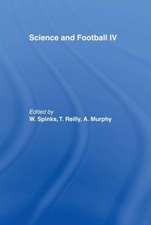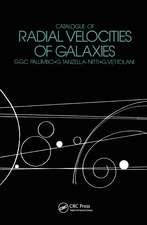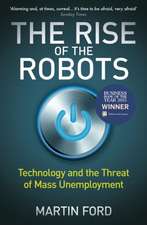Meeting Places: Scientific Congresses and Urban Identity in Victorian Britain: Science, Technology and Culture, 1700-1945
Autor Louise Miskellen Limba Engleză Paperback – 15 noi 2016
| Toate formatele și edițiile | Preț | Express |
|---|---|---|
| Paperback (1) | 469.34 lei 43-57 zile | |
| Taylor & Francis – 15 noi 2016 | 469.34 lei 43-57 zile | |
| Hardback (1) | 1109.18 lei 43-57 zile | |
| Taylor & Francis – 28 mar 2013 | 1109.18 lei 43-57 zile |
Din seria Science, Technology and Culture, 1700-1945
-
 Preț: 469.34 lei
Preț: 469.34 lei -
 Preț: 469.34 lei
Preț: 469.34 lei - 12%
 Preț: 299.52 lei
Preț: 299.52 lei -
 Preț: 469.34 lei
Preț: 469.34 lei -
 Preț: 469.34 lei
Preț: 469.34 lei -
 Preț: 489.26 lei
Preț: 489.26 lei -
 Preț: 464.12 lei
Preț: 464.12 lei -
 Preț: 489.26 lei
Preț: 489.26 lei - 26%
 Preț: 821.13 lei
Preț: 821.13 lei -
 Preț: 469.34 lei
Preț: 469.34 lei -
 Preț: 469.34 lei
Preț: 469.34 lei -
 Preț: 486.49 lei
Preț: 486.49 lei -
 Preț: 416.22 lei
Preț: 416.22 lei -
 Preț: 469.34 lei
Preț: 469.34 lei - 17%
 Preț: 259.98 lei
Preț: 259.98 lei - 17%
 Preț: 259.98 lei
Preț: 259.98 lei - 12%
 Preț: 299.52 lei
Preț: 299.52 lei - 26%
 Preț: 821.13 lei
Preț: 821.13 lei -
 Preț: 489.26 lei
Preț: 489.26 lei - 20%
 Preț: 250.58 lei
Preț: 250.58 lei - 26%
 Preț: 876.78 lei
Preț: 876.78 lei -
 Preț: 384.66 lei
Preț: 384.66 lei - 16%
 Preț: 261.54 lei
Preț: 261.54 lei - 18%
 Preț: 1001.77 lei
Preț: 1001.77 lei -
 Preț: 390.39 lei
Preț: 390.39 lei
Preț: 469.34 lei
Nou
Puncte Express: 704
Preț estimativ în valută:
89.82€ • 93.20$ • 75.07£
89.82€ • 93.20$ • 75.07£
Carte tipărită la comandă
Livrare economică 17-31 martie
Preluare comenzi: 021 569.72.76
Specificații
ISBN-13: 9781138267107
ISBN-10: 1138267104
Pagini: 208
Dimensiuni: 156 x 234 mm
Greutate: 0.45 kg
Ediția:1
Editura: Taylor & Francis
Colecția Routledge
Seria Science, Technology and Culture, 1700-1945
Locul publicării:Oxford, United Kingdom
ISBN-10: 1138267104
Pagini: 208
Dimensiuni: 156 x 234 mm
Greutate: 0.45 kg
Ediția:1
Editura: Taylor & Francis
Colecția Routledge
Seria Science, Technology and Culture, 1700-1945
Locul publicării:Oxford, United Kingdom
Cuprins
Contents: Introduction; Movable feasts: Victorian knowledge associations and the evolution of the annual meeting; The bidding contest; Running the meeting; Experiencing the meeting; Beyond the meeting: host towns and the parliaments of science effect; Conclusion; Appendices; Bibliography; Index.
Notă biografică
Louise Miskell is Senior Lecturer in the Department of History and Classics at Swansea University.
Recenzii
'The book's primary focus upon the urban dimension of the weekly parliaments rather than their scientific or intellectual content pays real dividends. The richly documented and meticulous case-studies illuminate the impact of the congresses upon the towns involved ... By deploying a wealth of primary source materials, most of which have not been exploited by urban historians in this kind of way before ... this book offers a new and genuinely Britain-wide perspective on a period when comparison and competition between neighbouring places was a constant preoccupation of urban elites.' Urban History 'While the British Association for the Advancement of Science has long formed a subject of research for historians of science, Louise Miskell does a useful service by putting it in the context not of the reforms of the Royal Society or the foundation of disciplinary societies, but of other similar peripatetic associations and of the urban locations that hosted them.' British Journal for the History of Science
Descriere
The four national associations studied in this book are the British Association for the Advancement of Science (BAAS), the National Association for the Promotion of Social Science (NAPSS), the Royal Archaeological Institute (RAI) and the Royal Agricultural Society of England (RASE), who held annual meetings in 62 different provincial towns and cities from 1831 to 1884. In this book it is contended that these meetings were as important as royal visits and major civic ceremonies in providing towns with an opportunity to promote their own status and identity. By deploying a wealth of primary source material, this book offers a new and genuinely Britain-wide perspective on a period when comparison and competition with neighbouring places was a constant preoccupation of town leaders.
